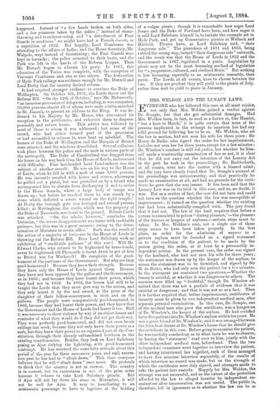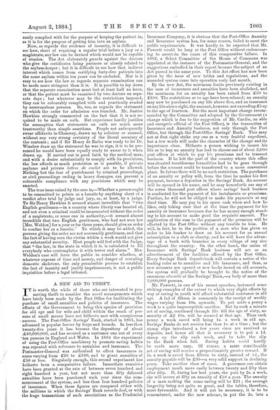MRS. WELDON AND THE LUNACY LAWS.
EVERYONE who has followed this case at all must rejoice, not only that Mrs. Weldon gained a verdict against Dr. Semple, but that she got substantial damages. Had Mrs. Weldon been, in fact, as mad as a hatter or, like Hamlet, "but a hare in March," it is quite certain that none of the persons implicated in the attempt to imprison her had any solid ground for believing her to be so. Mr. Weldon, who set the law in motion, had not seen his wife for three years ; Sir Henry de Bathe, who signed the order for her imprisonment, had also not seen her for three years, except for a few minutes ; Dr. Winslow's conduct is still sub judice, but whether he him- self made a trustworthy examination of her or not, it is clear that he did not carry out the intention of the Lunacy Act in the part he took in the proceedings ; Dr. Rudderforth, at all events, went into the matter with a biassed mind ; and the jury have clearly found that Dr. Semple's account of his proceedings was untrustworthy, and that practically he made no examination at all, and had no grounds for the certi- ficate he gave that she was insane. It has been said that the Lunacy Law was on its trial in this case, and so, no doubt, it was. But as a matter of fact., the case did not turn and could not turn on the question whether the law was susceptible of improvement ; it turned on the question whether the existing law had been substantially complied with. The jury found that it had not. The law of the land requires that before a person is committed to prison "during pleasure,"—the pleasure of the doctors or keepers of asylums,—certain steps must be taken. In Mrs. Weldon's case, not a single one of those steps seems to have been taken properly. In the first place, an order for the admission of anyone to a private asylum must be founded on a signed statement as to the condition of the patient, to be made by the person giving the order, or at least by a presumably in- dependent person. In the present case, the order was signed by the husband, who had not seen his wife for three years ; the statement was drawn up by the keeper of the asylum, to whom the statement was to be furnished, and signed by Sir H. de Bathe, who had only seen the patient for a few minutes. In the statement are contained two questions,—Whether the lunacy is suicidal, or whether it was dangerous to others. The answers were filled up "doubtful," though Dr. Winslow ad- mitted that there was not a particle of evidence that it was suicidal or dangerous ; and that it was not so as a fact. Then it is further required that, before imprisonment, certificates of insanity must be given by two independent medical men, after separate personal examination. In this case, Dr. Semple, one of the medical men who gave the certificate, was a hanger-on of Dr. Winslow's, the keeper of the asylum. He had certified forty-five patients into Dr. Winslow's asylum within ten years. He was a great friend of Dr. Winslow's; and it was arranged between the friends at dinner at Dr. Winslow's house that he should give the certificate in this case. Before going to examine the patient, he was carefully coached-up as to what facts he was to observe, by having the "statement" read over to him, jointly with the other independent medical man, beforehand. Then the two independent examiners went together to interview the patient, and haring interviewed her together, each of them managed to have five minutes' interview separately, of the results of which interview no record was made, but on the strength of which the certificates were duly signed, and attempts made to take the patient into custody. Happily for Mrs. Weldon, the attempt was not successful, and so the extent of the protection afforded by the law to alleged lunatics by independent ex- amination after incarceration was not tested. The public is, therefore, left in ignorance as to whether the law can be as
easily complied with for the purpose of keeping the patient in, as it is for the purpose of getting him into an asylum.
Now, as regards the evidence of insanity, it is difficult to see how, short of requiring a regular trial before a jury or a magistrate, any law can be devised which would not be capable of evasion. The Act elaborately guards against the doctors who give the certificates being partners or closely related to the asylum-keeper ; but it is difficult to see how that indirect interest which comes from certifying forty-five patients into the same asylum within ten years can be excluded. Nor is it easy to see how the law as regards separate examination can be made more stringent than it is. It is possible to lay down that the separate examination must last at least half an hour, or that the patient must be examined by two doctors on sepa- rate days ; but whatever may be the restrictions imposed, they can be colourably complied with and practically evaded by unscrupulous persons. So, too, as regards the statement on which the order for admission was founded. Mr. Justice Hawkins strongly commented on the fact that it is not re- quired to be made on oath. But experience hardly justifies the assumption that statements on oath are much more trustworthy than simple assertions. People not unfrequentiv swear affidavits in Chancery, drawn up by solicitor or counsel., without any very strong certainty of the literal accuracy of the contents ; and if Sir Henry de Bathe was ready to let Dr. Winslow draw up the statement he was to sign, it is to be pre- sumed he would have been equally ready to swear to it when drawn up. If carried out in good faith by the medical man, and with a desire substantially to comply with its provisions, the law affords as much protection as is possible, if private asylums and private lettres de cachet are to be allowed. Nothing but the fear of punishment by criminal proceedings, or civil proceedings ending in heavy damages, can prevent a colourable compliance with any provisions which may be enacted.
The true issue raised by the case is,—Whether a person ought to be committed to prison as a lunatic by anything short of a verdict after trial by judge and jury, or, at least, by a judge. To Sir Henry Hawkins it seemed almost incredible that "two English gentlemen—in a country where liberty was boasted of, and not even a criminal could be incarcerated without the order of a magistrate, or some one in authority,—it seemed almost incredible that two English gentlemen, who had not seen her [Mrs. Weldon] for a year or for three years, should give an order to confine her as a lunatic." To which it may be added, the persons giving the order are not necessarily gentlemen, and that the fact of having seen the victim within a week would not give any substantial security. Most people will feel with the Judge, that "the law, in the state in which it is, is calculated to fill everybody who contemplates it with terror and alarm." Mrs. Weldon's case will force the public to consider whether, at whatever expense of time and money, and danger of revealing domestic skeletons, the only permissible process to establish the fact of insanity and justify imprisonment, is not a public inquisition before a legal tribunal.



































 Previous page
Previous page